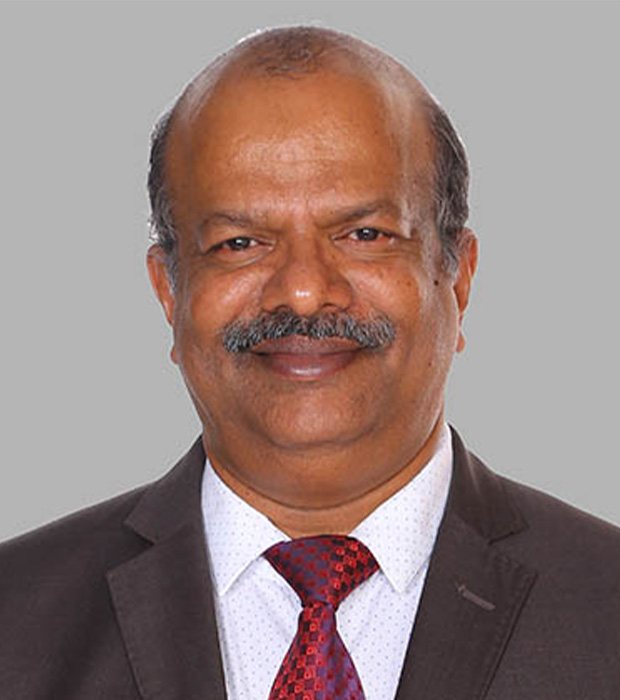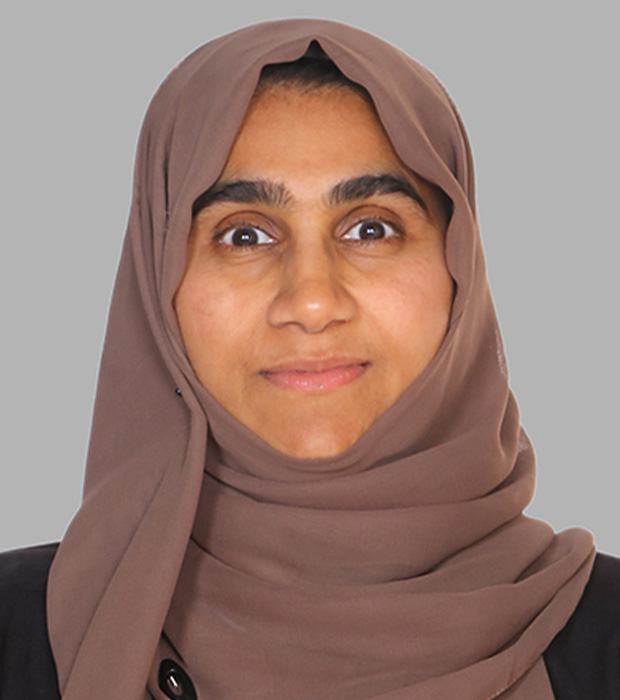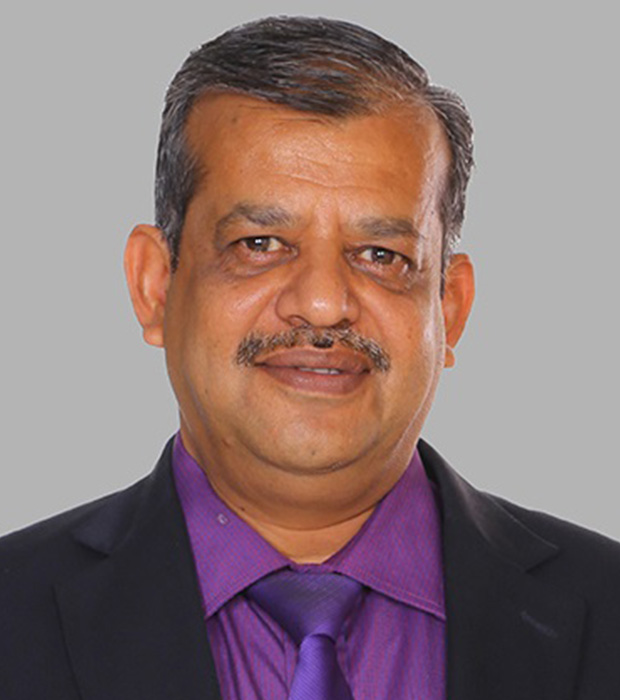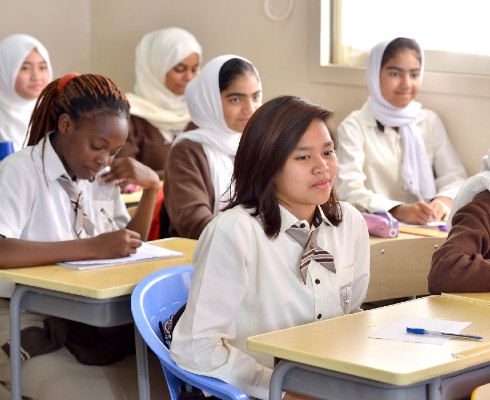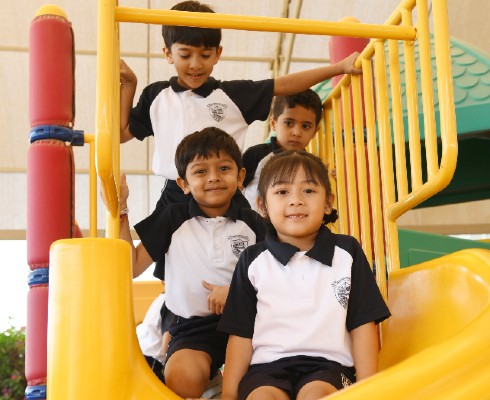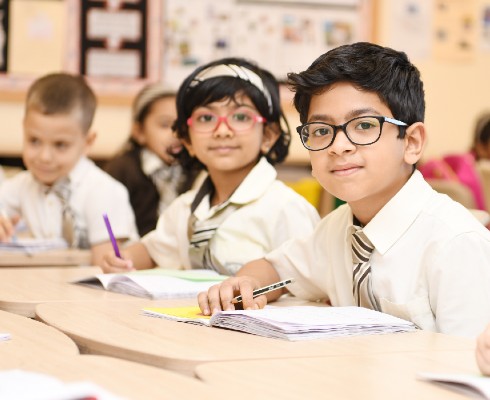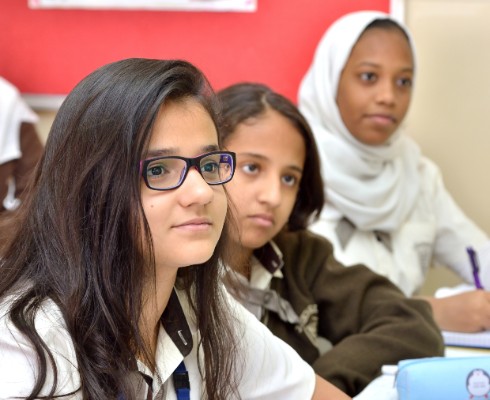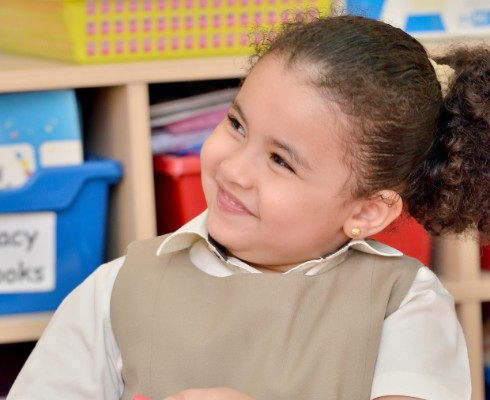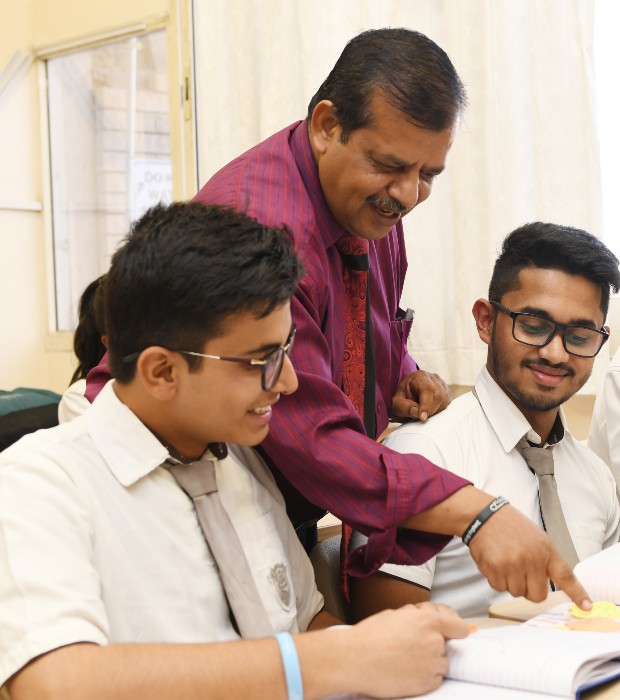
Secondary School - CBSE
During these years, our children are gradually prepared to accept additional challenges. Students become aware of the need to set goals and have long-term objectives. At this stage, pupils follow the pattern set by the Central Board of Secondary Education, New Delhi.
At Grade 5, the students choose to study the syllabus by CBSE, India or CIE, UK.
In addition to their normal classroom studies, they are provided with various opportunities for the careful development of their mental, physical and artistic talents.
CBSE Curriculum Overview
-
Key Information
CENTRAL BOARD OF SECONDARY EDUCATION (CBSE) stands committed to ensuring that the students are provided with an education that prepares them for attaining the standards and benchmarks laid out by the Board. It aspires to lay down a set of standards and best practices as paradigms for attaining individual and institutional excellence.
Imparting quality education to the learners has always been one of the priority areas in the development plans of CBSE. With the adoption of Sustainable Development Goals 2030 by India, comprehensive approaches and strategies are being devised to address the issue of achieving student driven outcomes across the schools.
CBSE recognizes and understands that the fast pace of knowledge, economic stress and social uncertainty, technological changes, worldwide interdependence, and the changing paradigms in the field of education will involve a great deal of perspective, thought and experimentation. No one really knows what the world will look like when the kindergartners graduate from schools. But all that we may know is that the world would be very different from the one we have grown up in. Educators and school leaders, thus face a tremendous challenge which can't be ignored which is: to broaden students' perspectives, catalyze innovation, encourage the students to think differently and live in a world of interconnectedness.
In Our Own English High School, Alain, we follow the CBSE curriculum from grades 6-12. We, in Our Own English High School, Alain, understand that school improvement is not an event but a continual process. We follow the CBSE curriculum because it is an attempt to allow all of us to make informed choices, articulate what we want and compare it with a realistic assessment of current reality, collectively aspire for a goal, reflect and initiate dialogues, recognize and manage the complexities at large and thus deal effectively with the forces that shape the consequences of our actions.
By following the CBSE curriculum standards, it gives us a possible direction to bringing quality learning to our school. It is an exhaustive self-explanatory curriculum and our school continually modifies so as to meet the needs of all the learners and has been made to make it implementable, feasible, transparent, objective and with an underlying measure of acceptability and credibility. We view the curriculum as a tool for a self -improvement cycle which is ongoing and although benchmarked by best global standards, is also rich in its local requirements.
We, at OOEHS Al Ain would also reassure stakeholders such as employees, professional bodies and the general public that the school aspires for continual improvement and thus will benefit the student learning outcomes.
-
Course Options
Grades 6 to 8
During these years, our children are gradually prepared to accept additional challenges. Students become aware of the need to set goals and have long-term objectives. At this stage, pupils follow the pattern set by the Central Board of Secondary Education, New Delhi. In addition to their normal classroom studies, they are provided with various opportunities for the careful development of their mental, physical and artistic talents.
Subjects at the Middle School
Scholastic Non-Scholastic English Physical Education
Mathematics Art / Craft
Science Music
Social Studies (Indian History and Civics, Geography)
Club Activities
UAE Social Studies
Second Language: Hindi, French and Malayalam
Moral Education
Lower Arabic
Islamiat/ Moral Instruction
Computer Science
Grades 9 to 10
In the secondary school, students are encouraged to develop in-depth knowledge of curriculum contents both in theory as well as in application.
The integrated, investigative and problem solving approach in learning helps the students in secondary school to further develop their 21st century skills which allows them to be successful in all subject areas and prepares them for future challenges. The assessment scheme is based on the CBSE pattern and gives a 20% weightage to formative assessments and 80% weightage to the annual examination. The students will appear for the All India Secondary Examination (AISSE) conducted by Central Board of Secondary Education, New Delhi, at the end of Grade 10.
Subjects at the Secondary School
Scholastic Non-Scholastic English Language & Literature Physical Education
Mathematics Art / Craft
Science Music
Social Science Club Activities
Islamiat/Moral Instruction Arabic Moral Education
UAE Social Studies Second Language (Hindi / French / Malayalam) Artificial intelligence Grades 11 to 12
Students in the Senior Secondary phase begin to become more specialised in their studies and focus on eventual career choices. The amount of specialist teaching increases to equip students for higher education and the professional world.
This is the Plus Two Stage in the 10+2 pattern of education leading to the All India Senior School Certificate Examination (AISSCE) conducted by the Central Board of Secondary Education, Delhi.
Subjects at the Senior School
Science Stream Commerce Stream English Core English Core Arabic Arabic Physics Economics Chemistry Accountancy Biology / Engineering Graphics Business Studies Mathematics / Informatics Practices / Psychology Mathematics / Informatics Practices / Psychology
Islamic Studies(Compulsory for all Muslim students) Islamic Studies(Compulsory for all Muslim students) General Studies General Studies
Computer Science Career counseling and preparation for university progression is an integral part of the secondary curriculum.
-
Extra-curricular Activities
Our Own English High school, Al Ain continues to offer challenges to the students through various intra and inter school activities and competitions, thereby molding them to be world citizens. Students are given the opportunity to participate in almost all inter-school competitions where they emerge victorious.
The school's enrichment program includes school extra-curricular activities (ECA), that take place during the day or after school on weekly basis. These activities provide opportunities for students to discover their talents and abilities, and to enable students to create and innovate. It is our objective to encourage balanced, holistic development in addition to a sense of healthy competition and team spirit. Students' life skills are also improved through helping them to develop balanced personalities together with physical fitness.
These activities encourage students to explore and develop their personalities, creativity and skills.
Closely linked with the afternoon sessions are games, support classes, sports and other physical education programs.
- Enhance Learning (Math, English, Science)
- Digital Technology (Robotics, Science / Math Club/ STEAM Activities)
- Performing and Creative Arts (Art and Crafts, Music Club)
- Leadership (Debating)
- Sports - Chess, Football, Basketball, Zumba)
In addition, for students to showcase their talents we have the Montage in the month of December and the competitions run through three days - competitions like Quiz, Mind Craft, Music, Art attack, Arabic Short skit, Entrepreneur at Large, Fashion designing, Advertisements, Back drop designing, Music Mania for Juniors and Seniors, Mural Painting, Pencil sketch, Film craft, Arabic Dance and House Fusion dance.
Further, we provide our students the platform to voice out their opinions and tackle major global issues through competitions such as Model United Nations, Inter-House Debates and Elocution competition. We encourage students to think innovatively and come up with brilliant and ingenious solutions to modern day problems through our Science and Social Science Symposiums along with our ‘Project Based Learning’ modules.
Academics and academic achievement is one of the cornerstones of OOL. We deliver a wide range of fun, exciting and challenging competitions and activities to our students such as the Math, Science and English Olympiads. In addition to this we also provide academic support classes for those students who need more support in academics.
To embrace one’s identity is the key to become a global citizen in the 21st century. Therefore, we embolden our students to take pride in their identities through competitions and activities on events such as ‘My Identity Day Celebrations’ and ‘Emirati Children’s Day’
-
Educational Supervisor
-
Assistant Supervisor - Girls
-
Assistant Supervisor - Boys
Frequently Asked Questions
-
What are the school facilities available?
For our students to feel enthused, engaged, and inspired, they must be allowed to explore learning in well-equipped surroundings using state-of-the-art facilities.
With this in mind, Our Own English High School offers an impressive range of learning tools and educational resources. Discover more about our campus and facilities here.
-
What is your teaching approach?
Our aim in teaching is to create a situation where students become enthusiastic about understanding the subject matter themselves and consequently deeply integrate new content and frames of meaning into their way of thinking. This approach can generally be called student-centred and problem-based.
CBSE's global curriculum comprises built-in activities and exercises which promote cross curricular learning. This approach supports two important goals: the ability to apply knowledge effectively in a variety of contexts and to engage in higher level reasoning skills.
-
How does curriculum help in the learning process?
The curriculum ensures that each school is teaching students relevant material and monitoring the progress of students from all types of backgrounds.
A school's curriculum informs teachers what skills must be taught at each grade level to ultimately prepare students for postsecondary education or a job.
-
What is digital learning technology?
Digital learning is a type of learning that is accompanied by technology or by instructional practice that makes effective use of technology. It encompasses the application of a wide spectrum of practices including: blended and virtual learning.
Students are exposed to various tech tools which motivates and enhances learning.
BYOD sessions are integrated with regular classes to make the use of technology as a regular practice to measure the understanding and the progress in the course of the lesson.
Teachers are facilitators of students learning and creators of productive classroom environment. For learning to be effective, we adapt our teaching pace, approaches and assessment practices which are differentiated- for Gifted & Talented and Special Needs.
We guide learners to activate prior knowledge, and assimilate and accommodate new knowledge through exploration, and experiential learning. This allows them to build a strong foundation of knowledge by connecting new ideas and experiences with what they already know, thus facilitating the understanding of concepts and the application of what they have learnt to different contexts and beyond.
We guide them to construct, interpret, and evaluate knowledge from a multidisciplinary approach. We are focusing more on Inquiry based learning - where learning content is a means to develop information processing and problem solving skills. There is more emphasis on “how we come to know” than on “what we know”. The use of technology to connect students with world communities which are rich sources of learning.
Assessment is focused on determining the progress of skills development in addition to content understanding and helps children become self-directed learners - Formal & Informal Assessments. (AFL, AOL, ASL as per CBSE guidelines, refer to CBSE circulars uploaded. We have designed assessments with clarity of purpose with different tools & techniques (Quiz, Projects, Journals, Debate, etc.) & Rubrics.
We also use different Techtools to further enhance teaching and learning. It also provides feedback to address learning gaps and improve teaching practices.
Syllabus
-
Accounting
-
Biology
-
Business Studies
-
Chemistry
-
Economics


